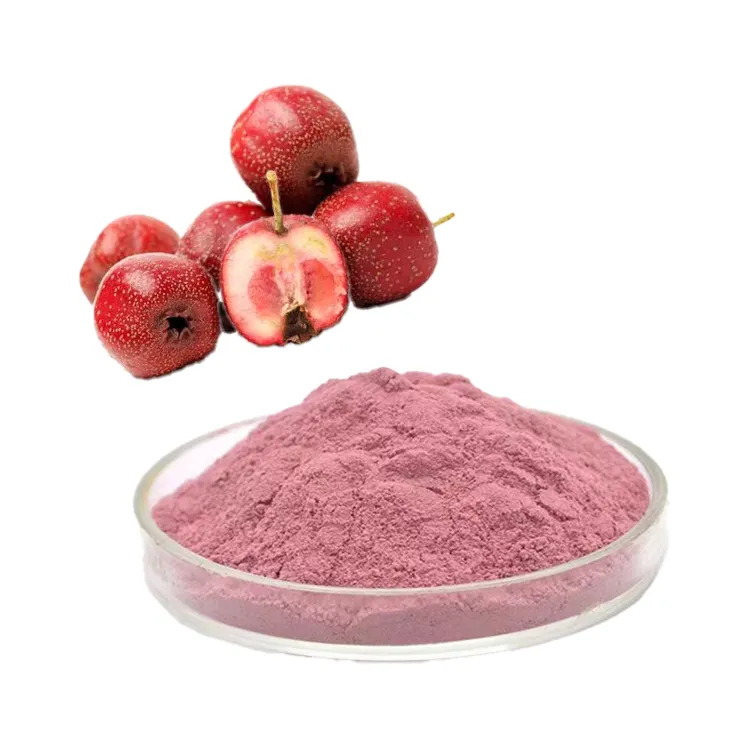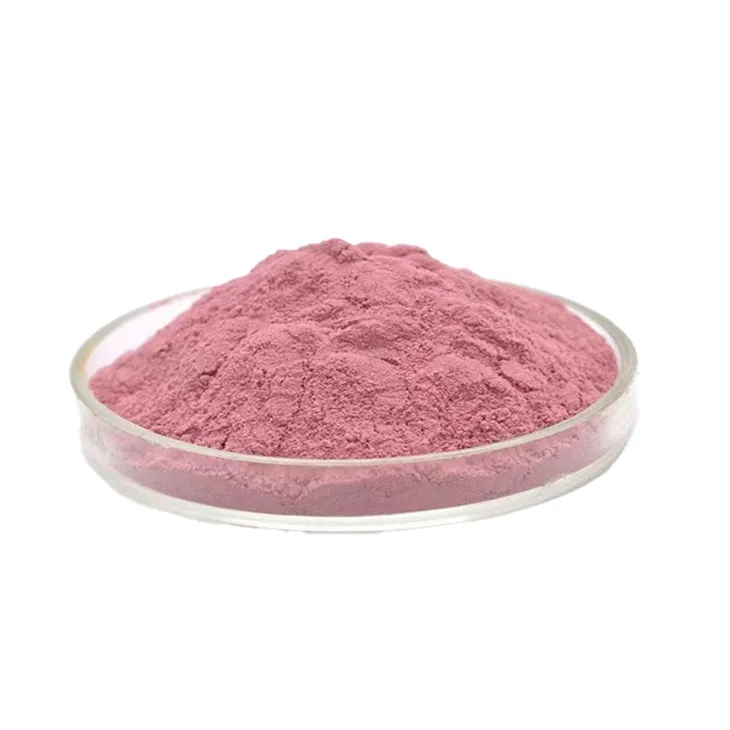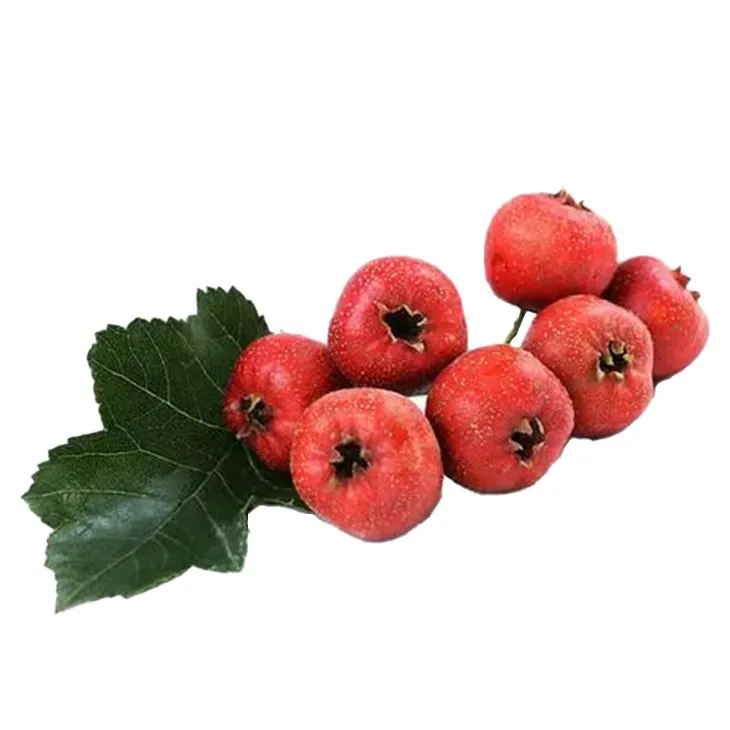- 0086-571-85302990
- sales@greenskybio.com
What is hawthorn powder? Definition, types, history and nutritional value.
2024-12-17

1. Definition of Hawthorn powder
Hawthorn powder is a fine - ground substance that is obtained from hawthorn fruits, leaves or sometimes even the bark. It is a product of processing hawthorn through methods such as drying and grinding. The resulting powder retains many of the beneficial properties of the original hawthorn plant. Hawthorn itself is a small tree or shrub that is native to many regions around the world, and the powder form makes it more convenient for various applications in the fields of food, medicine, and cosmetics.

2. Types of Hawthorn powder
2.1 Raw Hawthorn Powder
Raw hawthorn powder is the simplest form. It is made directly from dried and ground hawthorn fruits without any additional additives. This type of powder is often preferred by those who want to experience the pure and natural properties of hawthorn. It has a strong, characteristic flavor of hawthorn and can be used in a variety of ways, such as in making herbal teas or adding to smoothies for a natural health boost.
2.2 Processed Hawthorn Powder with Additives
There are also hawthorn powders that are processed with additional ingredients. For example:
- Some may be combined with other herbs such as ginseng or wolfberry to enhance its overall health - promoting effects. The combination with ginseng might be aimed at improving both energy levels and cardiovascular health, while the addition of wolfberry could contribute to better eye health and antioxidant protection.
- Others may have added sweeteners like honey powder or stevia for those who find the natural sourness of hawthorn powder a bit too strong. This makes it more palatable for consumption, especially for those who want to use it as a dietary supplement on a regular basis.
- In some cases, hawthorn powder may be processed with certain vitamins or minerals. For instance, the addition of vitamin C could further enhance its antioxidant properties, while the addition of calcium might be beneficial for bone health in addition to the general health benefits of hawthorn.

3. History of Hawthorn Powder
The history of hawthorn powder can be traced back to ancient times.
- In traditional Chinese medicine, hawthorn has been used for thousands of years. It was highly regarded for its ability to aid digestion. Ancient Chinese physicians recognized that hawthorn could help break down food, especially greasy or fatty foods, and relieve symptoms such as abdominal distension and indigestion. Over time, as the understanding of herbal medicine advanced, the use of hawthorn extended to other areas such as cardiovascular health. Hawthorn powder became one of the forms in which hawthorn was prepared for medicinal use, as it was easier to store, transport, and administer compared to whole hawthorn fruits or extracts.
- In European traditional medicine, hawthorn also had a long - standing history. It was used to treat heart - related problems. The knowledge of hawthorn's medicinal properties was passed down through generations of herbalists. Hawthorn powder, in this context, was often used in the form of tinctures or added to herbal mixtures for the treatment of heart diseases, including heart failure and arrhythmia. The preparation of hawthorn powder in Europe was also influenced by local cultural and environmental factors, with different regions having their own methods of harvesting, drying, and grinding hawthorn to produce the powder.
- Native American cultures also had their own experiences with hawthorn. Although the use of hawthorn powder as we know it today may not have been exactly the same, they used hawthorn in various forms to treat ailments. Hawthorn was considered a valuable plant for maintaining overall health, and it was used in different herbal remedies. As cultures interacted over time, the knowledge of hawthorn's uses spread, and the production and application of hawthorn powder became more diverse.

4. Nutritional Value of Hawthorn Powder
4.1 Dietary Fiber
Hawthorn powder is an excellent source of dietary fiber. Dietary fiber plays a crucial role in maintaining intestinal health. It helps to promote regular bowel movements, preventing constipation. Fiber - rich hawthorn powder also aids in the absorption of water in the intestines, which can contribute to a feeling of fullness and may be helpful for those trying to control their weight. Additionally, it can act as a prebiotic, providing nourishment for beneficial gut bacteria. These bacteria, in turn, play important roles in various aspects of health, such as enhancing the immune system and improving nutrient absorption.
4.2 Phenolic Acids
Hawthorn powder contains phenolic acids, which are bioactive substances. Phenolic acids have anti - inflammatory effects. Inflammation is associated with many chronic diseases, such as heart disease, diabetes, and arthritis. By reducing inflammation, the phenolic acids in hawthorn powder may help in the prevention and management of these diseases. Moreover, phenolic acids also have antioxidant properties. Antioxidants are important for neutralizing free radicals in the body. Free radicals are unstable molecules that can cause damage to cells, DNA, and proteins. By scavenging free radicals, the phenolic acids in hawthorn powder can help protect the body from oxidative stress, which is linked to aging and various diseases.
4.3 Vitamins and Minerals
Hawthorn powder also contains certain vitamins and minerals.
- It contains vitamin C, which is well - known for its antioxidant properties. Vitamin C is also essential for the synthesis of collagen, a protein that is important for the health of skin, bones, and connective tissues. In addition, it can boost the immune system, helping the body to fight off infections.
- There are also minerals present in hawthorn powder. For example, potassium is one of the minerals found in it. Potassium is important for maintaining normal heart function and regulating blood pressure. Adequate potassium intake can help prevent hypertension and reduce the risk of heart disease.
4.4 Flavonoids
Hawthorn powder is rich in flavonoids. Flavonoids are a type of phytochemical that has numerous health - promoting effects. They can improve blood circulation by relaxing blood vessels. This can be beneficial for cardiovascular health, as it helps to reduce blood pressure and improve the supply of oxygen and nutrients to the body's tissues. Flavonoids also have anti - platelet aggregation properties, which means they can prevent blood platelets from sticking together and forming clots. This can further reduce the risk of heart attacks and strokes.

FAQ:
What are the main processing methods for hawthorn powder?
Common processing methods include drying hawthorn fruits and then grinding them into powder. Some may involve steps like pre - treatment to remove impurities, and in some cases, additional ingredients might be added during the processing for specific purposes. For example, if the hawthorn powder is intended for use in a certain type of beverage, sweeteners or flavor - enhancers could be added during the production process.
Can hawthorn powder be used for weight loss?
Hawthorn powder may contribute to weight loss to some extent. As it is rich in dietary fiber, it can increase the feeling of fullness, which may help reduce overall food intake. However, it should not be considered as the sole method for weight loss. A balanced diet and regular exercise are still crucial components of a healthy weight - loss plan.
How should hawthorn powder be stored?
Hawthorn powder should be stored in a cool, dry place, away from direct sunlight. It is best to keep it in an airtight container to prevent moisture absorption and oxidation. If stored properly, it can maintain its quality for a relatively long time.
Are there any side effects of consuming hawthorn powder?
While hawthorn powder is generally safe for consumption, in some cases, excessive intake may cause side effects. For example, it may cause stomach discomfort, especially for those with sensitive stomachs. Also, people taking certain medications, such as blood - thinning drugs, should consult a doctor before consuming hawthorn powder as it may interact with the medications.
What are the differences between different types of hawthorn powder?
The differences mainly lie in the processing methods and added ingredients. Raw hawthorn powder without additives is more in its natural state, retaining most of the original nutrients of hawthorn. Processed hawthorn powder with added ingredients may have different flavors or functions. For instance, some may be formulated for better solubility in water for making drinks, while others may be enhanced with vitamins or minerals for added nutritional value.
Related literature
- The Nutritional and Medicinal Properties of Hawthorn: A Comprehensive Review"
- "Hawthorn in Traditional Medicine: Historical and Contemporary Perspectives"
- "Exploring the Bioactive Compounds in Hawthorn Powder and Their Health Benefits"
- ▶ Hesperidin
- ▶ citrus bioflavonoids
- ▶ plant extract
- ▶ lycopene
- ▶ Diosmin
- ▶ Grape seed extract
- ▶ Sea buckthorn Juice Powder
- ▶ Beetroot powder
- ▶ Hops Extract
- ▶ Artichoke Extract
- ▶ Reishi mushroom extract
- ▶ Astaxanthin
- ▶ Green Tea Extract
- ▶ Curcumin Extract
- ▶ Horse Chestnut Extract
- ▶ Other Problems
- ▶ Boswellia Serrata Extract
- ▶ Resveratrol Extract
- ▶ Marigold Extract
- ▶ Grape Leaf Extract
- ▶ blog3
- ▶ blog4
- ▶ blog5
-
Pure 85% Tomentil Extract.
2024-12-17
-
Black Rice Extract
2024-12-17
-
Plantain extract
2024-12-17
-
Pine bark Extract Powder
2024-12-17
-
Giant Knotweed Extract
2024-12-17
-
Genistein
2024-12-17
-
Apricot Powder
2024-12-17
-
Okra Extract
2024-12-17
-
Citrus Aurantii Extract
2024-12-17
-
Nutmeg Extract
2024-12-17
-
Hawthorn powder
2024-12-17




















